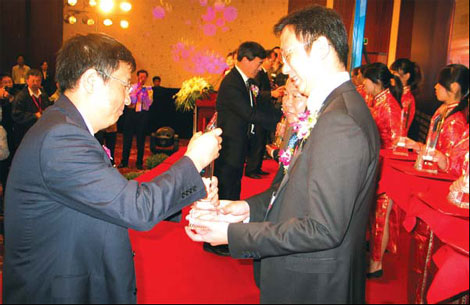Conference Special: Young business leaders lauded in Taicang
|
China Daily Deputy Editor-in-Chief Kang Bing presents an award to one of the recipients. Song Wenwei / China Daily |
Emerging business leaders gathered yesterday at the annual Yangtze River Delta Young Entrepreneurs Forum in Taicang, Jiangsu province, to exchange stories and outline their ambitions.
As globalization and economic integration bring unprecedented opportunities to the Yangtze River Delta, young founders of businesses are taking on more social responsibility to meet regional development goal.
To further interaction among young entrepreneurs, the China and Overseas Young Business Leaders Union was inaugurated during the forum.
During a roundtable on "our own era's young models", young businesspeople voiced their eagerness to reach the forefront of innovation and development in the region.
"Young entrepreneurs these days are required to have inspiration, a big heart, generosity, a sense of sharing, social responsibility and the ability of consistent learning to make themselves outstanding," said Fang Chaoyang, chairman of Changjiang & Jinggong Steel Building (Group) Co Ltd, one of the seven Yangtze River Delta Young Business Leaders.
Fang started the business 10 years ago and his company went on to supply the steel for the National Stadium, or Bird's Nest, built for the 2008 Olympics and the 492-meter-tall skyscraper Shanghai World Financial Center.
But the advancement of a company relies on its social responsibility and paying back to the public, he added. "So I suggest our entrepreneurs pay more attention to low carbon and energy efficiency no matter what businesses you are doing," Fang said.
"Thanks to the great time we live in, we are given the historically golden chance to develop our enterprises," said Li Huashan, chairman of Sino Lion (US) Ltd.
"How to make good use of your luck in business leadership and make China better is the task lying ahead of our young entrepreneurs," said Li.
"China is the best place for us to learn how to do business," said Larry Chan, president of Liwayway (China) Co Ltd.
"From my 15 years' experience in China, I've learned the importance of product quality, service and localization," he added.
"More importantly, we can replicate our mature and successful mode in China in Asian neighbors including Vietnam, Myanmar, Cambodia and India," said Chan, a Filipino-Chinese who came to China at the age of 22.
"The rapid economic and social development in China requires businesspeople to adapt to the fast pace quickly, and meanwhile, it also creates more opportunities," said one of the Top 10 Outstanding Young Businessmen.
This is the third year for Jiangsu to organize the annual forum intended to create a bridge between outstanding young businesspeople from overseas and peers in government, industry, academia, research and media in the Yangtze River Delta.
More than 300 officials from Jiangsu, Zhejiang and Shanghai together with foreign experts, scholars and young business leaders attended this year's event.
The forum is sponsored by the Youth Union of Shanghai, Zhejiang and Jiangsu, the Overseas Chinese Association of Jiangsu province, Taicang government and China Daily.
Following six months' selection, the forum's organizer selected the 27 finalists for the Yangtze River Delta Young Business Leaders, Top 10 Outstanding Young Businesspeople and Top 10 New Elites.
Award winners are expected to have dialog with their counterparts in the United States to push forward bilateral exchange and communication.
As the host city of the forum, Taicang was an emperor's barn in history - literally its name. The city is a natural seaport with a prime location of 60 kilometers northwest of Shanghai, and 60 kilometers east of Suzhou.
Taicang ranked in the top 10 of the National Bureau of Statistics' 100 Most Competitive County-level Cities in China in 2010.
It also ranked as the seventh-best county-level city according to a report by the Chinese edition of Forbes in September. The ranking was based on 132 candidate cities with GDP of above 36 billion yuan ($5.4 billion) in 2009.
(China Daily 10/22/2010 page15)















